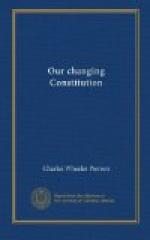That cooeperation has not always been forthcoming. In the year 1802, Congress, at the instigation of President Jefferson, the inveterate enemy of Chief Justice Marshall, suspended the sessions of the Court for more than a year by abolishing the August term. In 1832, when the State of Georgia defied the decree of the Court in a case involving the status of the Cherokee Indians, the other departments of the Federal Government gave no aid and President Andrew Jackson is reported to have remarked: “John Marshall has made the decision, now let him execute it.” In 1868, Congress, in order to forestall decision in a case pending before the Court, hastily repealed the statute on which the jurisdiction of the Court depended.[1] Such instances, however, have been rare. The law-abiding instinct is strong in the American people, and for the most part the decisions of the Supreme Court have been received with respect and unquestioning obedience.
[Footnote 1: See ex parte McCardle, 6 Wall. (Supreme Court Reports), 318; 7 id., 506.]
The chief weapon in the arsenal of the Court is the power to declare legislative acts void on the ground that they overstep limits established by the people in the Constitution. This power has been frequently exercised. It is stated that the congressional statutes thus nullified have not numbered more than thirty, while at least a thousand state laws have been nullified.[1]
[Footnote 1: Brief of Solicitor General James M. Beck in the Child Labor Tax cases. It is to be borne in mind that there are forty-eight state legislatures and only one Congress.]
The assumption of this power in the Court to declare statutes unconstitutional has been bitterly assailed, and is still denounced in some quarters, as judicial usurpation originated by John Marshall.
On the historical side this objection is not well founded. Various state courts had exercised the power to declare statutes unconstitutional before the Supreme Court came into existence.[1] The framers of the Constitution clearly intended that such a power should be exercised by the Supreme Court.[2] Moreover, a somewhat similar power appears to have been exercised long before in England,[3] though it gave place later to the present doctrine of the legal omnipotence of Parliament.
[Footnote 1: See Bryce: “The American Commonwealth,” Vol. I, p. 250.]
[Footnote 2: See e.g., “Federalist,” No. LXXVIII.]
[Footnote 3: See opinion of Lord Coke in Bonham’s Case, 8 Coke’s Reports, 118, decided in 1610.]
On the side of reason and logic, the argument in favor of the power formulated more than a century ago by Chief Justice Marshall has never been adequately answered and is generally accepted as final. He said:[1]




